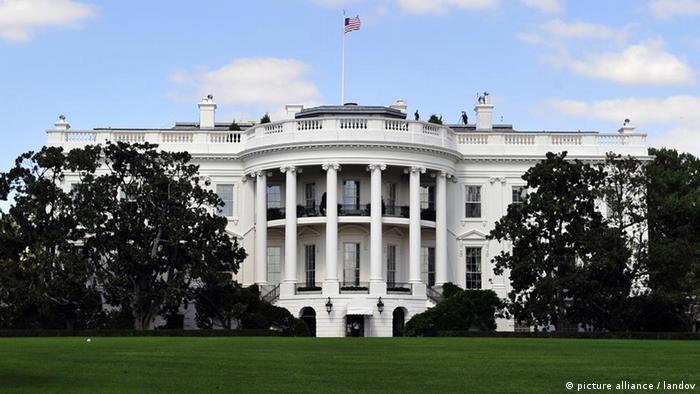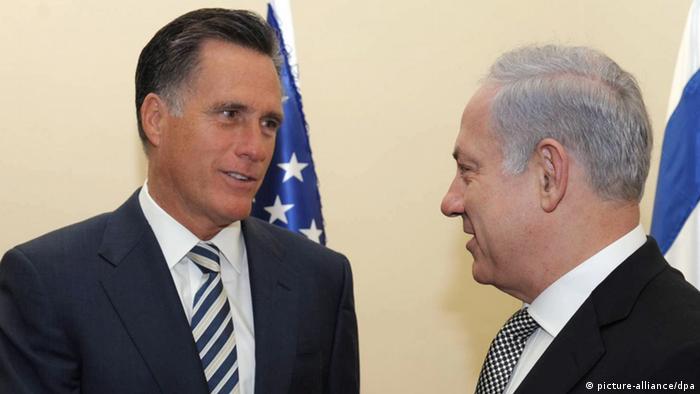The recently revealed long-standing friendship between Mitt Romney and Benjamin Netanyahu caused quite a stir in the US election campaign. But their ties won't have a big impact, even if Romney wins the White House.
The close personal relationship between presumptive Republican presidential nominee Mitt Romney and Israeli Prime Minister Benjamin Netanyahu depicted in detail by The New York Times recently wasn't entirely unknown. But it was the first time it had really been brought to international attention.
Since it was published at a moment when the US presidential campaign is in full swing and the international community is debating about a possible Israeli strike against Iran, the story garnered plenty of discussion.
Friends for decades
At the heart of the ensuing brouhaha about the personal ties that have bound Romney and Netanyahu since both first met at the Boston Consulting Group in 1976 is the question of whether their relationship is beneficial or detrimental to US-Israeli relations - and by extension to global affairs.

Netanyahu und Obama have difficult relations
The mere story of the close personal relationship between Romney and Netanyahu - as that of any international leaders - would already have piqued public interest. For instance, Romney revealed in the piece that both he and Netanyahu can "almost speak in shorthand" and that they "share common experiences and have a perspective and underpinning which is similar."
What makes the story even more interesting is of course the backdrop of the well-known fraught relationship between Netanyahu and the current US President Barack Obama. But the real trigger that revved up the discussion was a remark made by Romney during the Republican presidential campaign which was quoted by The New York Times.
Outsourced Middle East policy
In a debate, Romney criticized his opponent Newt Gingrich for a remark about the Palestinians by saying: "Before I made a statement of that nature, I'd get on the phone to my friend Bibi Netanyahu and say: 'Would it help if I say this? What would you like me to do?'."
This caused Martin Indyk, a former US ambassador under Bill Clinton, to say that Romney's remark implied that he would "subcontract Middle East policy to Israel." "That, of course," Indyk was quoted in the article "would be inappropriate."
Reacting to the piece, Israel's ambassador in Washington wrote a letter to the editor stating that "Israel does not interfere in internal political affairs of the United States - contrary to the article's insinuation - and greatly values the wide bipartisan support it enjoys in America."
So how big of an impact will the close ties between Romney and Netanyahu have on US-Israeli relations? And secondly, will this impact be positive or negative for both nations?
National constituency takes precedence
Two experts contacted by DW emphasize that analyzing possible consequences of those ties requires the double assumption that Romney will in fact become president and that Netanyahu will remain prime minister - both of which are uncertain.
Their take in a nutshell: The close ties between the two men will have very little impact but this will be positive, depending on the underlying policy.
The personal chemistry between leaders plays an important role in bilateral relations, argues Mark Heller, a US expert at the Tel Aviv-based Institute for National Security Studies. But it's also crucial not to exaggerate what the impact might be, he adds.

Should Romney get elected, he wouldn't forget who helped him into the White House
"After all, both people will be leaders of their own countries and they will primarily be concerned with their understanding of their own countries interests," Heller says.
That is because long-standing national interests don't change suddenly just because two leaders share close personal ties. After all, argue the experts, democratically elected leaders don't live in a vacuum, but are part of an intricately woven web of political, electoral, economic, and medial connections that form their national constituency.
Serving that constituency simply supersedes personal relationships.
Getting along helps
Still, contend the experts, a sound relationship is generally preferable to a fraught one, says Ambassador Arthur Hughes, an Israel expert at the Middle East Institute in Washington.
"Because a relationship of trust and confidence between two leaders is always good as long as that basic policy formulation is right," Hughes says.
That applies to the Romney-Netanyahu relationship as well.
"Netanyahu has a tendency to inform and even to lecture and to explain in great detail his perspectives and those from his point of view of his country," explains Hughes.
Romney with his close personal bond with Netanyahu should certainly listen to that, but could then also express his own views very candidly in a way that Obama with his tense relationship with the prime minister probably couldn't do as easily.
Both Hughes and Heller don't think Romney's remark about phoning his friend Bibi before making statements should be taken at face value or that it implied an outsourcing of US Middle East policy.
Electoral play
Heller calls the outsourcing claim "silly," saying it is simply common sense in international relations to consult as much as possible. He contends that it is wrong and naive to assume that just because both are friends and share common perspectives, that as president or prime minister they would simply fulfill each others political wishes or demands.

Netanyahu is considered a savvy tactitian
"I didn't take that Romney statement too serious that he would check things out first with Netanyayu," Hughes notes. He believes the idea behind the remark was purely for domestic electoral reasons, that is, to find something to criticize Gingrich for and to show potential voters with an interest in Israel that he was a solid friend of the country.
"I didn't take literally what Romney actually said," Hughes says.
What impact then would the Romney-Netanyahu relationship have for the two most important issues in the Middle East: the peace process between Israelis and Palestinians and Iran's nuclear program? Not much, agree the experts.
On the nuclear issue, both governments are already working very closely together, so a President Romney wouldn't change any of that.
And on the Middle East peace issue, President Obama has learned that it's fairly difficult to push Netanyahu to do something he doesn't want to do. Thus it would appear unlikely that this would change under a Romney administration.
Author: Michael Knigge
Editor: Sabina Casagrande
Editor: Sabina Casagrande

Comments